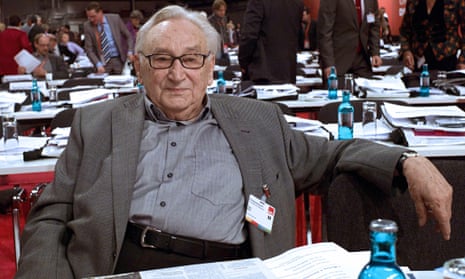In 1963, Egon Bahr was the press spokesman for Willy Brandt, a world-renowned figure as mayor of West Berlin, the enclave that was both symbol and front line of the cold war between east and west. That year Bahr produced a paper with the unexciting title of Change Through Rapprochement. It was a statement of principle for what became known as Ostpolitik – eastern policy – and Bahr, who has died aged 93, went on to be a leading figure in its realisation.
Ostpolitik was usually described as a programme of detente whereby West Germany sought reconciliation with the communist bloc in eastern Europe – the Soviet Union and its Warsaw Pact allies including East Germany. And so it was. But Bahr’s long-term objective was German reunification, to be achieved by a “policy of small steps”. The countries that had borne the brunt of Nazi German brutality had to be won over if that unlikely goal was ever to be reached.
Brandt moved on to the larger stage of West German federal politics in 1965, when he stood as the Social Democrats’ candidate for chancellor. After the winning Christian Democrat/Liberal coalition fell apart a year later, Brandt’s party formed a grand coalition with the Christian Democrats. Brandt became deputy chancellor and foreign minister, and at once began to put Ostpolitik into practice, meeting communist leaders.
His powerful charm and proven anti-Nazi credentials made him the ideal “front man” for reconciliation. But the hard, detailed work was being done in the background by Bahr, who had moved from Berlin to Bonn, the West German federal capital, with Brandt and became head of the political planning staff at the foreign ministry. He opened lines of communication with both Washington and Moscow and sought to improve relations step by step with Warsaw, Prague and, most delicate of all, with East Berlin as capital of the East German state. While Brandt was the captain on the bridge, Bahr was in charge of the engine-room.
Bahr was born in Treffurt, Thuringia, in central Germany, to Karl, a teacher, and his half-Jewish wife, Hedwig. Under the Nazis this Jewish connection prevented Bahr from studying music, and on entering a Luftwaffe flying school in 1942 he was denied a commission and was sent to work in an arms factory in 1944 as a “non-Aryan” who had “sneaked into the forces”.
After the second world war Bahr went into journalism in Berlin. When his first newspaper was taken over by the Communist regime he resigned to work for the independent press in the west of the divided city. In 1950 he joined RIAS, the US-sponsored broadcaster in West Berlin as its chief political commentator, later working from Bonn. After a brief stint as press attache in the West German embassy in Ghana, Bahr returned to West Berlin in 1960 to take charge of the city-state’s press office. In this role he developed a close and deep political and personal friendship with Brandt.
At the federal election in 1969 the Social Democrats (SPD) were beaten once more by the CDU (Christian Democrats) led by the chancellor, Kurt Georg Kiesinger. Even as Washington rushed to congratulate Kiesinger, Brandt was forming a coalition with the Liberal Free Democrats (FDP) under Walter Scheel, ousting the CDU. Brandt thereupon became chancellor with Scheel as his deputy and foreign minister.
Bahr now became state secretary (the highest civil service rank) in the chancellor’s office. Before the end of 1969 Brandt sent him to Moscow to negotiate treaties with the Soviet Union and its allies, including East Germany. Pacts with Moscow, Warsaw and others, plus agreements on transit and basic relations with East Berlin, were successfully arrived at.
Bahr was recognised as the architect of the “eastern treaties”. But as the west looked on in admiration and the east came to respect West Germany, internal opposition to Ostpolitik mounted, in the CDU, the rightwing press and above all among organisations representing expellees and exiles from the east who regarded any deal with communists as akin to treason. Brandt’s slender majority in the Bundestag was eroded amid rumours of fat brown envelopes changing hands in the corridors.
Forced into a premature election in which the main issue was the ratification of the eastern treaties, Brandt and Scheel romped home in a resounding and euphoric victory in 1972. But only two years later an exhausted and depressed Brandt resigned after an East German spy was discovered in the chancellery. Bahr, a member of the Bundestag since 1972, was seen there with his head in his hands, in tears. He resigned too, but was soon recalled to office by Helmut Schmidt, Brandt’s successor, as minister for economic co-operation.
He left office in 1976 to become parliamentary manager of the SPD for five years and quit the Bundestag in 1990 – the year of the unification treaty between the two German states. His ultimate objective was achieved, albeit under a CDU government. Bahr was as astonished as anyone when the Berlin Wall came down in 1989 and the door to unification opened.
Bahr is survived by his third wife, Adelheid, and three children.
Egon Karlheinz Bahr, politician and journalist, born 18 March 1922; died 20 August 2015

Comments (…)
Sign in or create your Guardian account to join the discussion